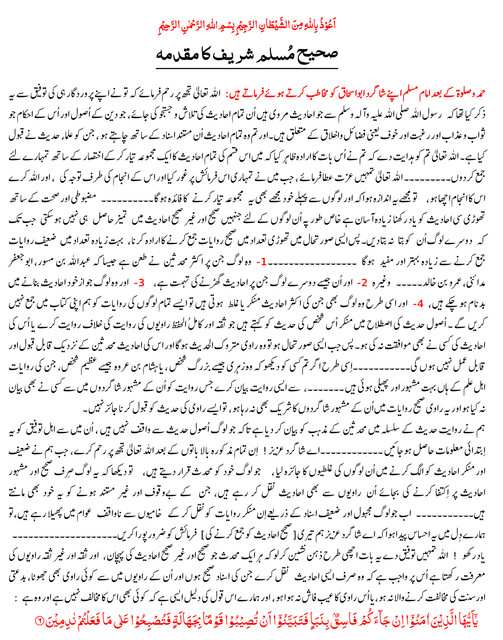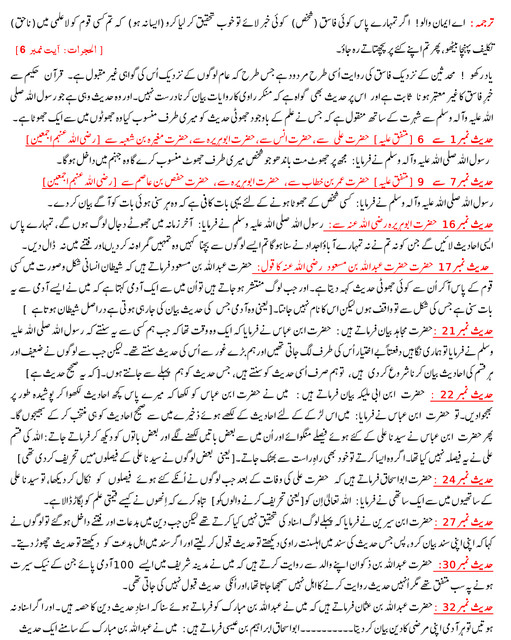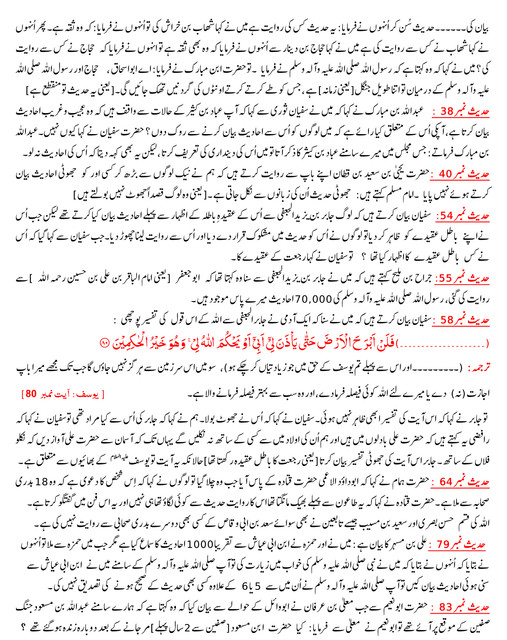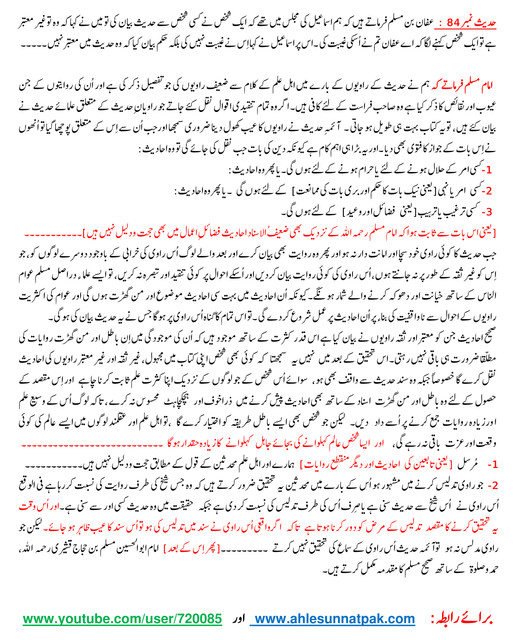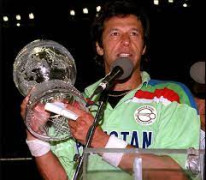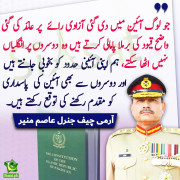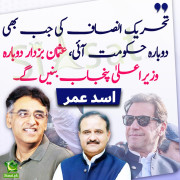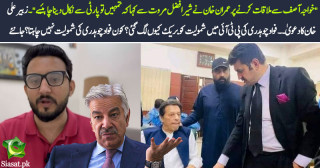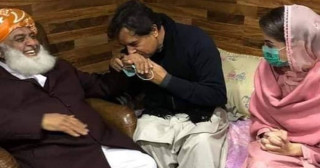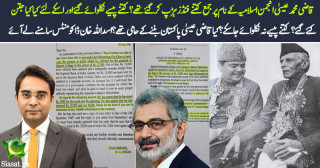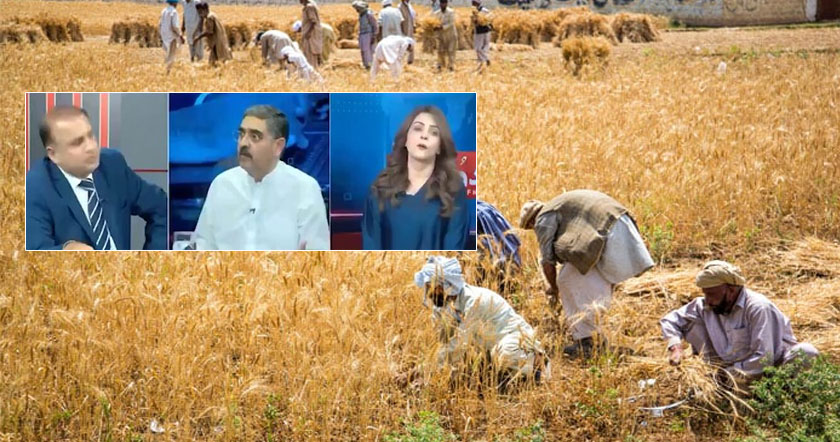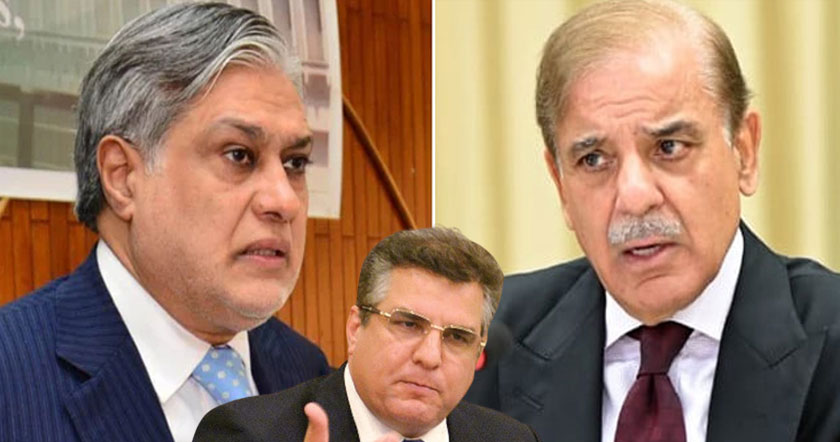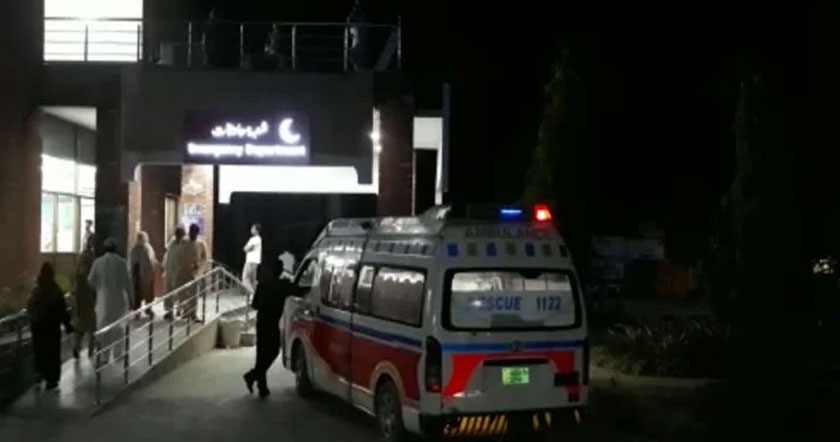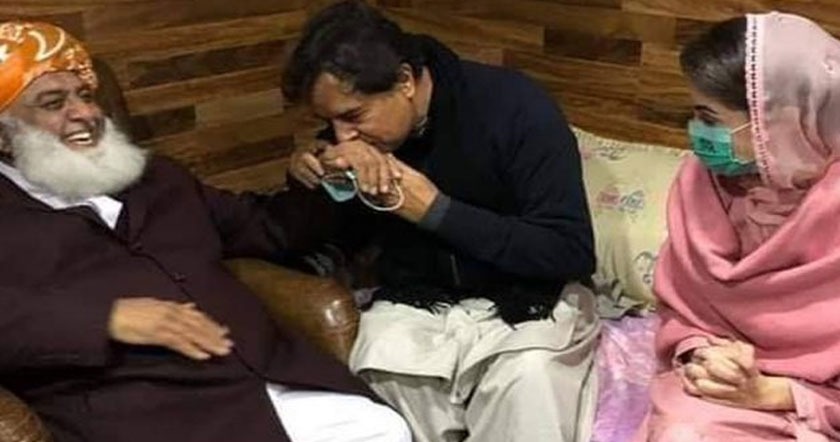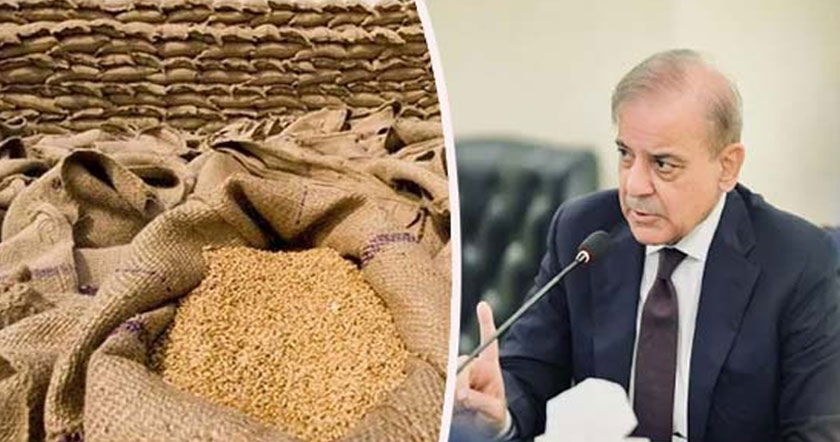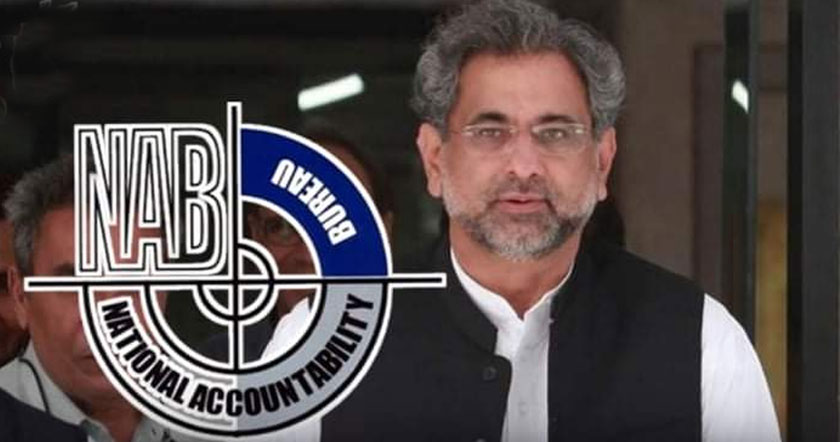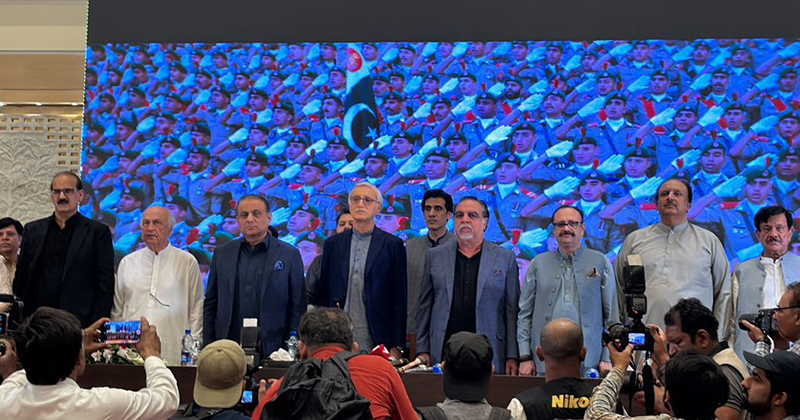Now a days there is too much Propaganda against Muslims by Christians where they mention some fabricated hadeeths to defame Muslims. Unfortunately some of the Shia brothers has also teamed with them. I thought it may be useful for the members to know the reality of these fabricated Hadeeth. Below is the article explaining the fabricated hadeeth about a goat eating Qur'an etc.
Question: There is this hadith that a Christian is posting in Internet forums. It is hadith no. 1944 in Sunan Ibn Maajah, Kitaab an-Nikaah, which has to do with a goat eating the Qur’an. It was posted in a forum for discussion between Muslims and Christians. I would like to know the whole story about this matter and its history.
Answer: Firstly:
Talking about the hadith mentioned in the question requires a little detail from specialists in the study of hadith. It is not sufficient to give a general answer or an answer based only on one’s personal view of the matter. Therefore we hope that the questioner will learn and pay attention to the way in which we will trace different versions of the hadith, with different chains of narrators. Thus the facts about it will become clear, in sha Allah.
All versions of the hadith are based on the following chain of narrators:
‘Abdullah ibn Abi Bakr ibn Hazm, from ‘Amrah bint ‘Abd ar-Rahmaan, from ‘Aa’ishah (may Allah be pleased with her). The isnaad ends with her and does not go back to the Prophet (blessings and peace of Allah upon him).
The hadith was taken from ‘Abdullah ibn Abi Bakr by a number of narrators and their narrations are as follows:
1. It was narrated by Yahya ibn Sa‘eed al-Ansaari. His version says: It was revealed in the Qur’an that ten definite breastfeedings are required (to establish the relationship of mahram), then it was also revealed that five definite breastfeedings are required.
This was narrated by Imam Muslim in his Saheeh (no. 1452) and others. We may note that this version does not say anything about the story of the goat or tame sheep eating any of the pages of the Holy Qur’an.
2. It was narrated by Imam Maalik (may Allah have mercy on him). His version says: Among that which was revealed of the Qur’an was the ruling that those ten definite breastfeedings are required to establish the relationship of mahram, then that was abrogated and replaced with five definite breastfeedings. When the Messenger of Allah (blessings and peace of Allah be upon him) died, this was among the things that were recited in the Qur’an.
This was narrated by Maalik in al-Muwatta’ (Kitaab ar-Ridaa‘, hadith no. 17), and via him by Imam Muslim (1452) and others. We may note here that the report of Imam Maalik from ‘Abdullah ibn Abi Bakr also does not include any mention of the story of the goat or tame sheep eating anything of the Mus-haf. Rather one sentence is added to it at the end: When the Messenger of Allah (blessings and peace of Allah be upon him) died, this was among the things that were recited in the Qur’an.
3.It was narrated by Muhammad ibn Ishaaq. His version says: The verse of stoning and breastfeeding of an adult ten times was revealed, and it was written on a leaf that was kept beneath a bed in my [‘Aa’ishah’s] house. When the Messenger of Allah (blessings and peace of Allah be upon him) fell sick, we were preoccupied with his situation, and a little animal of ours came in and ate it.
This was narrated by Imam Ahmad in al-Musnad (43/343), and Ibn Maajah in as-Sunan (no. 1944); the latter version says: When the Messenger of Allah (blessings and peace of Allah be upon him) died, we were preoccupied with his death, and a tame sheep came in and ate it.
As you can see, this version does mention the odd phrase that is additional to what was narrated by the two great imams, Yahya ibn Sa‘eed al-Ansaari and Maalik ibn Anas (may Allah have mercy on them both). This is what the questioner referred to in his question. In this version of the hadith it says that a tame sheep – which is a sheep that people feed in their homes – came in and ate the page that contained the verse of stoning and the verse of breastfeeding an adult.
This difference was sufficient for the scholars of hadith to rule that the version narrated by Muhammad ibn Ishaaq was da‘eef (weak), and that it was to be rejected and regarded as odd. In their view, the odd hadith is any hadith in which a trustworthy narrator differed with that which was narrated by other trustworthy narrators who were more accurate than him in the narration or were greater in number. This is a sound academic principle, because how can one narrator have additional wording in a hadith that others also narrated from the original narrators, when the latter are greater in number, more accurate in memory and narration, and of higher status in knowledge of hadith? Why didn’t they also narrate this additional or different material? Is there any other way to understand what happened, except by referring to that rule in order to know where some narrators differed in their narration and included some odd material in it? If that is not the case (and you do not want to refer to that rule), then how could this debater convince us that Muhammad ibn Ishaaq learned of the hadith of ‘Aa’ishah that which both Yahya ibn Sa‘eed al-Ansaari and Maalik ibn Anas had forgotten, when they were both leading scholars and senior figures in their field? In fact Sufyaan ath-Thawri (may Allah have mercy on him) said: Yahya ibn Sa‘eed al-Ansaari was, in the view of the people of Madinah, of a higher standard in the field of hadith than az-Zuhri. ‘Ali ibn al-Madeeni regarded him as one of the most authentic and trustworthy narrators of hadith, and one of those concerning whom one would have no sense of unease with their hadith at all. Ahmad ibn Hanbal said concerning him: He is one of the most accurate in narration. Wuhayb said: I came to Madinah and I did not see anyone but you might feel comfortable with some of what they narrated and have reservations about other reports of theirs, except Maalik and Yahya ibn Sa‘eed (i.e., all of their reports could be accepted without reservation).
See: Tahdheeb at-Tahdheeb (11/223)
So how about if we know that Muhammad ibn Ishaaq is criticised by some scholars of hadith, and there were some mistakes that were noted in his narrations, and it was noted that he differed in some of his narrations from the narration of some leading trustworthy scholars? We cannot accept the narration of such a person if it differs from the narration of other trustworthy narrators, and we do not accept from him any weird or odd wording that other trustworthy narrators did not narrate.
Hanbal ibn Ishaaq said: I heard Abu ‘Abdullah say: The narration of Ibn Ishaaq cannot be used as proof.
‘Abdullah ibn Ahmad said: He – i.e., Ahmad ibn Hanbal – did not use his reports as evidence when discussing what is Sunnah.
Ayyoob ibn Ishaaq said: I asked Ahmad ibn Hanbal: O Abu ‘Abdullah, if Ibn Ishaaq is the only narrator of the hadith, will you accept it? He said: No, by Allah, for I have seen him putting together the words of many narrators in a single hadith, and not separating the narration of one person from that of another.
Yahya ibn Ma‘een classed him as da‘eef in one report narrated from him. An-Nasaa’i said: He is not qawiy (strong). Ad-Daaraqutni said: The leading scholars differed concerning him, and he is not an authority; rather his narration may be taken into consideration (alongside others)
See: Tahdheeb at-Tahdheeb (9/45).
We have previously discussed Muhammad ibn Ishaaq in detail in fatwa no. 148009
What will make the matter clearer is the fact that al-Qaasim ibn Muhammad, like ‘Abdullah ibn Abi Bakr, narrated the hadith without the additional material of Muhammad ibn Ishaaq.
At-Tahhaawi narrated in Sharh Mushkil al-Athaar (11/486): Muhammad ibn Khuzaymah told us: al-Hajjaaj ibn Minhaal told us: Hammaad ibn Salamah told us, from ‘Abd ar-Rahmaan ibn al-Qaasim, from al-Qaasim ibn Muhammad, from ‘Amrah, that ‘Aa’ishah (may Allah be pleased with her) said: Among the things that were revealed in the Qur’an, then abrogated, was that the relationship of mahram cannot be established except by ten breastfeedings, then after that it was revealed: or five breastfeedings.
To sum up, the story of the sheep eating a page of the Holy Qur’an in the house of ‘Aa’ishah (may Allah be pleased with her) is da‘eef (weak) and is not proven.
Ibn Qutaybah ad-Daynoori (may Allah have mercy on him) said:
The versions of the hadith narrated by Maalik are different to those narrated by Muhammad ibn Ishaaq, and Maalik is more accurate, according to the scholars of hadith, than Muhammad ibn Ishaaq.
End quote from Ta’weel Mukhtalif al-Hadith (p. 443)
The commentators on the Musnad of Imam Ahmad said:
Its isnaad is da‘eef because the only one who narrated it was Muhammad ibn Ishaaq, and its text contains something odd.
End quote from the Mu’sasat ar-Risaalah edn (43/343)
Al-Aloosi (may Allah have mercy on him) said:
With regard to the additional material having been on a page that was kept with ‘Aa’ishah and was eaten by the tame sheep, it is a fabrication and lie of the heretics that this was lost as the result of being eaten by a tame sheep without being abrogated. This is what it says in al-Kashshaaf.
End quote from Rooh al-Ma‘aani (11/140)
Ibn Hazm (may Allah have mercy on him) said:
It was proven that the wording was abrogated, but the sheet on which it was written remained, as ‘Aa’ishah (may Allah be pleased with her) said – then it was eaten by the tame sheep; but no one needs it (that verse). Something similar may be said with regard to the verse on breastfeeding, and there is no difference between the two. The proof of that is that they memorised (the verse) as we have mentioned. So if it was confirmed as being part of the Qur’an, the fact that the sheep ate it would not have changed the fact that it was part of the Qur’an, based on the fact that they had memorised it.
Thus we may conclude with certainty that no two Muslims differ concerning the fact that Allah, may He be exalted, enjoined upon His Messenger (blessings and peace of Allah be upon him) the conveying of the message, and that he (blessings and peace of Allah be upon him) conveyed it as he had been instructed to do. … And we may conclude, with regard to the verses that were lost, that if the Messenger of Allah (blessings and peace of Allah be upon him) had been instructed to convey them, he would have done so, and if he had conveyed them they would have been memorised, and if they had been memorised then the death of the Prophet (blessings and peace of Allah be upon him) would not affect the matter at all, just as the fact that he (blessings and peace of Allah be upon him) died did not affect anything else of what he had conveyed of the Qur’an.
End quote from al-Muhalla (12/177)
Al-Baaqilaani (may Allah have mercy on him) said:
There is no one on the face of the earth more ignorant than one who thinks that the Messenger and the Sahaabah were all careless with regard to the Qur’an and that they would not memorise it and learn it by heart, and that they would rely for confirming it on a sheet that was placed under the bed of ‘Aa’ishah only, a sheet that was thrown on the floor and disrespected, until the neighbourhood sheep came in and ate it, resulting in the loss of that sheet and whatever was written on it!
We wonder what it was that could have allegedly led the Messenger of Allah (blessings and peace of Allah be upon him) to such negligence, helplessness and carelessness, when he had been entrusted with the religion and had been instructed to protect it and preserve it, and to appoint scribes to write it, as he had a large number of people who were skilled in the field of writing, whose main task was to write down the Qur’an that was revealed to him, and to write down covenants, deeds, trusts and other matters that might occur or be connected to the Messenger, especially since there was a need to keep a record of it.
The main task of the Messenger (blessings and peace of Allah be upon him) was only to explain and protect the Qur’an, and protect the religion; he had no occupation or any other worldly concerns to distract him from that, except some efforts he might undertake to support and reinforce the religion, and to promote and explain the Qur’an. Otherwise, how could it be possible that all of these people and all of the Sahaabah would not be aware of the verses about breastfeeding and stoning, so that no one would know about them or refer to them, except ‘Aa’ishah alone?
Therefore, based on what we have described about how the Messenger was devoted to conveying the message, and the Sahaabah were keen to learn and memorise it, it is not possible that they could have lost something of the Book of Allah, may He be exalted, whether it was small or great; people of such calibre should be the greatest of people in memorising it and preserving what was revealed of it and what happened concerning it, such as the dates when it was revealed, the reasons for revelation, and what abrogated and was abrogated.
End quote from al-Intisaar li’l-Qur’an (1/412-418)
Whatever the case, what the Muslim is required to do is to constantly be aware and careful, so he should not believe everyone who makes some claim, and he should not follow every rumour, myth or story that is narrated here or there, especially in Internet chat rooms and forums, because they may be visited by knowledgeable and ignorant people alike, both speakers of truth and liars, sincere people and hateful hypocrites. Such matters require investigation and verification, by asking knowledgeable people and referring to authentic Islamic books; many such resources are widely available, praise be to Allah. Allah, may He be glorified and exalted, says (interpretation of the meaning): “And follow not (O man i.e., say not, or do not or witness not, etc.) that of which you have no knowledge (e.g. ones saying: ‘I have seen,’ while in fact he has not seen, or ‘I have heard,’ while he has not heard). Verily! The hearing, and the sight, and the heart, of each of those you will be questioned (by Allah)” [al-Isra’ 17:36].
For more information, see the answers to questions no. 22029 and 106399
And Allah knows best.
Source:
Question: There is this hadith that a Christian is posting in Internet forums. It is hadith no. 1944 in Sunan Ibn Maajah, Kitaab an-Nikaah, which has to do with a goat eating the Qur’an. It was posted in a forum for discussion between Muslims and Christians. I would like to know the whole story about this matter and its history.
Answer: Firstly:
Talking about the hadith mentioned in the question requires a little detail from specialists in the study of hadith. It is not sufficient to give a general answer or an answer based only on one’s personal view of the matter. Therefore we hope that the questioner will learn and pay attention to the way in which we will trace different versions of the hadith, with different chains of narrators. Thus the facts about it will become clear, in sha Allah.
All versions of the hadith are based on the following chain of narrators:
‘Abdullah ibn Abi Bakr ibn Hazm, from ‘Amrah bint ‘Abd ar-Rahmaan, from ‘Aa’ishah (may Allah be pleased with her). The isnaad ends with her and does not go back to the Prophet (blessings and peace of Allah upon him).
The hadith was taken from ‘Abdullah ibn Abi Bakr by a number of narrators and their narrations are as follows:
1. It was narrated by Yahya ibn Sa‘eed al-Ansaari. His version says: It was revealed in the Qur’an that ten definite breastfeedings are required (to establish the relationship of mahram), then it was also revealed that five definite breastfeedings are required.
This was narrated by Imam Muslim in his Saheeh (no. 1452) and others. We may note that this version does not say anything about the story of the goat or tame sheep eating any of the pages of the Holy Qur’an.
2. It was narrated by Imam Maalik (may Allah have mercy on him). His version says: Among that which was revealed of the Qur’an was the ruling that those ten definite breastfeedings are required to establish the relationship of mahram, then that was abrogated and replaced with five definite breastfeedings. When the Messenger of Allah (blessings and peace of Allah be upon him) died, this was among the things that were recited in the Qur’an.
This was narrated by Maalik in al-Muwatta’ (Kitaab ar-Ridaa‘, hadith no. 17), and via him by Imam Muslim (1452) and others. We may note here that the report of Imam Maalik from ‘Abdullah ibn Abi Bakr also does not include any mention of the story of the goat or tame sheep eating anything of the Mus-haf. Rather one sentence is added to it at the end: When the Messenger of Allah (blessings and peace of Allah be upon him) died, this was among the things that were recited in the Qur’an.
3.It was narrated by Muhammad ibn Ishaaq. His version says: The verse of stoning and breastfeeding of an adult ten times was revealed, and it was written on a leaf that was kept beneath a bed in my [‘Aa’ishah’s] house. When the Messenger of Allah (blessings and peace of Allah be upon him) fell sick, we were preoccupied with his situation, and a little animal of ours came in and ate it.
This was narrated by Imam Ahmad in al-Musnad (43/343), and Ibn Maajah in as-Sunan (no. 1944); the latter version says: When the Messenger of Allah (blessings and peace of Allah be upon him) died, we were preoccupied with his death, and a tame sheep came in and ate it.
As you can see, this version does mention the odd phrase that is additional to what was narrated by the two great imams, Yahya ibn Sa‘eed al-Ansaari and Maalik ibn Anas (may Allah have mercy on them both). This is what the questioner referred to in his question. In this version of the hadith it says that a tame sheep – which is a sheep that people feed in their homes – came in and ate the page that contained the verse of stoning and the verse of breastfeeding an adult.
This difference was sufficient for the scholars of hadith to rule that the version narrated by Muhammad ibn Ishaaq was da‘eef (weak), and that it was to be rejected and regarded as odd. In their view, the odd hadith is any hadith in which a trustworthy narrator differed with that which was narrated by other trustworthy narrators who were more accurate than him in the narration or were greater in number. This is a sound academic principle, because how can one narrator have additional wording in a hadith that others also narrated from the original narrators, when the latter are greater in number, more accurate in memory and narration, and of higher status in knowledge of hadith? Why didn’t they also narrate this additional or different material? Is there any other way to understand what happened, except by referring to that rule in order to know where some narrators differed in their narration and included some odd material in it? If that is not the case (and you do not want to refer to that rule), then how could this debater convince us that Muhammad ibn Ishaaq learned of the hadith of ‘Aa’ishah that which both Yahya ibn Sa‘eed al-Ansaari and Maalik ibn Anas had forgotten, when they were both leading scholars and senior figures in their field? In fact Sufyaan ath-Thawri (may Allah have mercy on him) said: Yahya ibn Sa‘eed al-Ansaari was, in the view of the people of Madinah, of a higher standard in the field of hadith than az-Zuhri. ‘Ali ibn al-Madeeni regarded him as one of the most authentic and trustworthy narrators of hadith, and one of those concerning whom one would have no sense of unease with their hadith at all. Ahmad ibn Hanbal said concerning him: He is one of the most accurate in narration. Wuhayb said: I came to Madinah and I did not see anyone but you might feel comfortable with some of what they narrated and have reservations about other reports of theirs, except Maalik and Yahya ibn Sa‘eed (i.e., all of their reports could be accepted without reservation).
See: Tahdheeb at-Tahdheeb (11/223)
So how about if we know that Muhammad ibn Ishaaq is criticised by some scholars of hadith, and there were some mistakes that were noted in his narrations, and it was noted that he differed in some of his narrations from the narration of some leading trustworthy scholars? We cannot accept the narration of such a person if it differs from the narration of other trustworthy narrators, and we do not accept from him any weird or odd wording that other trustworthy narrators did not narrate.
Hanbal ibn Ishaaq said: I heard Abu ‘Abdullah say: The narration of Ibn Ishaaq cannot be used as proof.
‘Abdullah ibn Ahmad said: He – i.e., Ahmad ibn Hanbal – did not use his reports as evidence when discussing what is Sunnah.
Ayyoob ibn Ishaaq said: I asked Ahmad ibn Hanbal: O Abu ‘Abdullah, if Ibn Ishaaq is the only narrator of the hadith, will you accept it? He said: No, by Allah, for I have seen him putting together the words of many narrators in a single hadith, and not separating the narration of one person from that of another.
Yahya ibn Ma‘een classed him as da‘eef in one report narrated from him. An-Nasaa’i said: He is not qawiy (strong). Ad-Daaraqutni said: The leading scholars differed concerning him, and he is not an authority; rather his narration may be taken into consideration (alongside others)
See: Tahdheeb at-Tahdheeb (9/45).
We have previously discussed Muhammad ibn Ishaaq in detail in fatwa no. 148009
What will make the matter clearer is the fact that al-Qaasim ibn Muhammad, like ‘Abdullah ibn Abi Bakr, narrated the hadith without the additional material of Muhammad ibn Ishaaq.
At-Tahhaawi narrated in Sharh Mushkil al-Athaar (11/486): Muhammad ibn Khuzaymah told us: al-Hajjaaj ibn Minhaal told us: Hammaad ibn Salamah told us, from ‘Abd ar-Rahmaan ibn al-Qaasim, from al-Qaasim ibn Muhammad, from ‘Amrah, that ‘Aa’ishah (may Allah be pleased with her) said: Among the things that were revealed in the Qur’an, then abrogated, was that the relationship of mahram cannot be established except by ten breastfeedings, then after that it was revealed: or five breastfeedings.
To sum up, the story of the sheep eating a page of the Holy Qur’an in the house of ‘Aa’ishah (may Allah be pleased with her) is da‘eef (weak) and is not proven.
Ibn Qutaybah ad-Daynoori (may Allah have mercy on him) said:
The versions of the hadith narrated by Maalik are different to those narrated by Muhammad ibn Ishaaq, and Maalik is more accurate, according to the scholars of hadith, than Muhammad ibn Ishaaq.
End quote from Ta’weel Mukhtalif al-Hadith (p. 443)
The commentators on the Musnad of Imam Ahmad said:
Its isnaad is da‘eef because the only one who narrated it was Muhammad ibn Ishaaq, and its text contains something odd.
End quote from the Mu’sasat ar-Risaalah edn (43/343)
Al-Aloosi (may Allah have mercy on him) said:
With regard to the additional material having been on a page that was kept with ‘Aa’ishah and was eaten by the tame sheep, it is a fabrication and lie of the heretics that this was lost as the result of being eaten by a tame sheep without being abrogated. This is what it says in al-Kashshaaf.
End quote from Rooh al-Ma‘aani (11/140)
Ibn Hazm (may Allah have mercy on him) said:
It was proven that the wording was abrogated, but the sheet on which it was written remained, as ‘Aa’ishah (may Allah be pleased with her) said – then it was eaten by the tame sheep; but no one needs it (that verse). Something similar may be said with regard to the verse on breastfeeding, and there is no difference between the two. The proof of that is that they memorised (the verse) as we have mentioned. So if it was confirmed as being part of the Qur’an, the fact that the sheep ate it would not have changed the fact that it was part of the Qur’an, based on the fact that they had memorised it.
Thus we may conclude with certainty that no two Muslims differ concerning the fact that Allah, may He be exalted, enjoined upon His Messenger (blessings and peace of Allah be upon him) the conveying of the message, and that he (blessings and peace of Allah be upon him) conveyed it as he had been instructed to do. … And we may conclude, with regard to the verses that were lost, that if the Messenger of Allah (blessings and peace of Allah be upon him) had been instructed to convey them, he would have done so, and if he had conveyed them they would have been memorised, and if they had been memorised then the death of the Prophet (blessings and peace of Allah be upon him) would not affect the matter at all, just as the fact that he (blessings and peace of Allah be upon him) died did not affect anything else of what he had conveyed of the Qur’an.
End quote from al-Muhalla (12/177)
Al-Baaqilaani (may Allah have mercy on him) said:
There is no one on the face of the earth more ignorant than one who thinks that the Messenger and the Sahaabah were all careless with regard to the Qur’an and that they would not memorise it and learn it by heart, and that they would rely for confirming it on a sheet that was placed under the bed of ‘Aa’ishah only, a sheet that was thrown on the floor and disrespected, until the neighbourhood sheep came in and ate it, resulting in the loss of that sheet and whatever was written on it!
We wonder what it was that could have allegedly led the Messenger of Allah (blessings and peace of Allah be upon him) to such negligence, helplessness and carelessness, when he had been entrusted with the religion and had been instructed to protect it and preserve it, and to appoint scribes to write it, as he had a large number of people who were skilled in the field of writing, whose main task was to write down the Qur’an that was revealed to him, and to write down covenants, deeds, trusts and other matters that might occur or be connected to the Messenger, especially since there was a need to keep a record of it.
The main task of the Messenger (blessings and peace of Allah be upon him) was only to explain and protect the Qur’an, and protect the religion; he had no occupation or any other worldly concerns to distract him from that, except some efforts he might undertake to support and reinforce the religion, and to promote and explain the Qur’an. Otherwise, how could it be possible that all of these people and all of the Sahaabah would not be aware of the verses about breastfeeding and stoning, so that no one would know about them or refer to them, except ‘Aa’ishah alone?
Therefore, based on what we have described about how the Messenger was devoted to conveying the message, and the Sahaabah were keen to learn and memorise it, it is not possible that they could have lost something of the Book of Allah, may He be exalted, whether it was small or great; people of such calibre should be the greatest of people in memorising it and preserving what was revealed of it and what happened concerning it, such as the dates when it was revealed, the reasons for revelation, and what abrogated and was abrogated.
End quote from al-Intisaar li’l-Qur’an (1/412-418)
Whatever the case, what the Muslim is required to do is to constantly be aware and careful, so he should not believe everyone who makes some claim, and he should not follow every rumour, myth or story that is narrated here or there, especially in Internet chat rooms and forums, because they may be visited by knowledgeable and ignorant people alike, both speakers of truth and liars, sincere people and hateful hypocrites. Such matters require investigation and verification, by asking knowledgeable people and referring to authentic Islamic books; many such resources are widely available, praise be to Allah. Allah, may He be glorified and exalted, says (interpretation of the meaning): “And follow not (O man i.e., say not, or do not or witness not, etc.) that of which you have no knowledge (e.g. ones saying: ‘I have seen,’ while in fact he has not seen, or ‘I have heard,’ while he has not heard). Verily! The hearing, and the sight, and the heart, of each of those you will be questioned (by Allah)” [al-Isra’ 17:36].
For more information, see the answers to questions no. 22029 and 106399
And Allah knows best.
Source:


